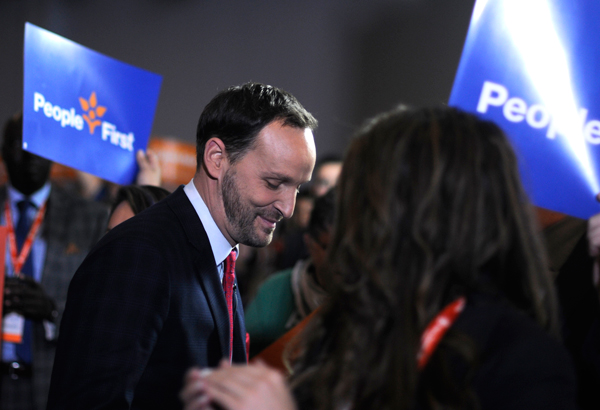
The next provincial election might be a little under a year away, but the provincial NDP is already getting set for the campaign trail.
Ryan Meili unveiled some of the first platform planks during an energetic speech in Prince Albert Saturday as part of the annual Saskatchewan NDP convention.
Those promises include a procurement strategy aimed at supporting Saskatchewan businesses and a cap on class sizes in K-3 classrooms. Other promises included a pledge to raise the minimum wage to $15 an hour within a year of taking office and implementing the Renew Saskatchewan plan, which seeks to support a clean energy transition. It was announced last October.
Meili also positioned the NDP as the “underdogs” going up against a powerhouse with more money.
“When I think about it that way, us as underdogs, it gives me a lot more confidence,” he told reporters following his speech.
“We’re underdogs as a party, but we’re also on the side of the underdogs, on the side of the people, and I think people are looking for … a party that’s willing to put them first.”
As for the platform promises, Meili’s commitment to keeping class sizes for kids in kindergarten to Grade 3 at 24 students or less comes at a time when the Saskatchewan Teachers’ Federation (STF) is fighting to include class size and composition matters in the next collective agreement with the province, something the province hasn’t been open to.
Speaking to the NDP convention the day before Meili’s keynote, STF president Patrick Maze said he isn’t looking for a hard cap, but rather a way to ensure that complicated classrooms have the proper support.
Meili said that while he understands the position, a class size cap for early years education makes sense.
“I spoke to Mr. Maze quite a bit before this and had some good input from him on how he felt about that, and he said yes when it comes to earlier grades … having more than 24 kids doesn’t make sense,” Meili said.
“It makes perfect sense that we keep those early years classes small enough so kids have the attention to learn. That’s in a classroom with regular kids without any extra challenges. When you start adding on kids with mental health needs, kids with special needs and other big challenges, we need to be looking at both size and the supports that are coming around those kids.”
Meili also talked about his plan that would see procurement look at more than just cost when choosing the top bidder.
“In terms of making sure we’re valuing the Saskatchewan company and Saskatchewan worker, that means when we’re doing procurement, taking into account the community impact, because right now it’s a simple bottom line,” he said.
“That doesn’t take into account where those workers are from and where they pay taxes. … When you look at that larger value proposition … you start to see a model where through community benefits agreements, we can actually see Saskatchewan companies able to compete or even outpace the companies from away because of that local impact.”
Meili said such a policy would be based on similar initiatives in BC and Alberta, as regulations preferring businesses in one geographic region run the risk of contravening interprovincial free trade agreements.
“When you look at who’s doing projects in Alberta, it’s Alberta companies,” Meili said.
“Who’s doing projects in Saskatchewan? Alberta companies. The way that things are working now clearly isn’t benefitting us and isn’t making that free trade agreement work as well as it should. We need to be talking to the other provinces and coming up with a process that works.”
While it’s unusual for a party to be unveiling key elements of its election platform a year out from the actual vote, Meili isn’t worried that the Saskatchewan Party will steal some of his party’s ideas.
“I always say I don’t care which party makes a good decision. If they want to steal a good idea and run with it, great. It’s a good idea and we need to get it done,” he said.
“In terms of rolling out platform ideas early, I like doing that because it gives us a chance to have the conversation. People aren’t going to hear it once and say ‘I‘ve changed my mind, I’m voting a different way.’ It takes time for people to understand and talk about it. We want to make sure we’re having a deeper, longer conversation with Saskatchewan people so they see what’s coming. Our vision is clear, it’s consistent and it’s going to work.”

